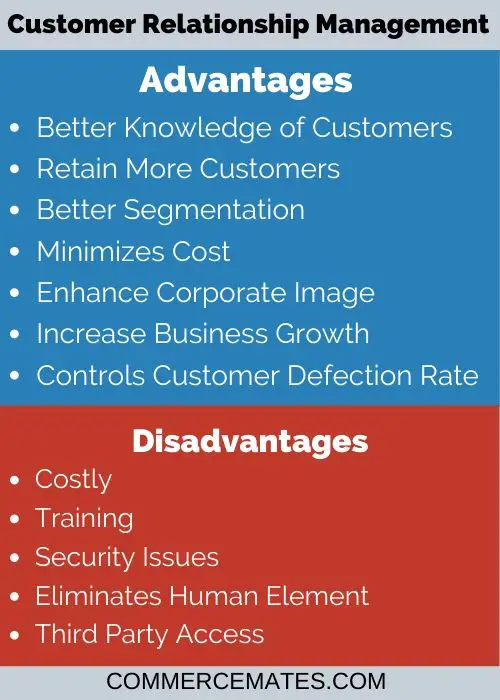Contents
Meaning of Customer Relationship Management
Customer Relationship Management is a process of managing the relationship between business and customers. It is a technique used by businesses to create better and long term relationships with customers. CRM is one of the important techniques used nowadays to increase the customer base. It helps in getting all the required information about target customers easily.
The information collected helps in understanding the customer’s behavior. After understanding customer’s behavior, they are treated accordingly. CRM enables an organization in providing better service and satisfaction to their customers. Business is successful if it is able to satisfy its customers properly. For using customer relationship management techniques, businesses use several CRM software. This software collects all required data from different customers. The information collected is integrated & stored in a single CRM database. These databases are then used by the businesses for taking information.

Advantages of Customer Relationship Management
- Better Knowledge of Customers: Customer Relationship Management is a customer-centric technique. The main focus of CRM technique is on the customers of Business. It helps businesses to acquire all required information of customers. This information is then stored and used for understanding customer behavior.
- Retain More Customers: It not only focuses on understanding and serving the existing customers of businesses. CRM aims at acquiring more and more customers for businesses. It targets to increase the customer base & retain them for the long term. Through CRM, a communication channel is developed between customers and business which acquires all information regarding customers.
- Better Segmentation: CRM enables businesses in the proper segmentation of market audiences in a systematic way. It collects and supplies all required information regarding potential customers which helps in classifying them according to their interests and criteria. CRM helps in creating groups of audience according to categories and thereby planning specific customer marketing campaigns.
- Minimizes Cost: Cost-effective is one of the major advantages of CRM to business. It helps in reducing cost associated with several processes in many ways. Firstly it reduces all the paperwork involved in different processes. All data is stored digitally on the database. Also, it reduces the manual work to be done in businesses. This leads to a decrease in staff requirements for manual work.
- Enhance Corporate Image: A good image in market is a dream for every business. Business having a good reputation enjoys several benefits in market. Customers get easily attracted to these brands. A good image of company also helps it in acquiring funds from the market. The image of a business is created by its customers. Customers when treated well & satisfied properly, they will definitely spread the good word about the business.
- Increase Business Growth: CRM has an effective role in increasing the profits & turnover of business. Through it, businesses increase their return on investment. CRM helps in creating more and more loyal customers for the long term. These all loyal customers do repeat purchases and increase the revenue of the business. Large revenues collected helps businesses in increasing their size.
- Controls Customer Defection Rate: Retaining customers is one of the major challenges for every business. In today’s competition customers are more frequently shifting from one product to another. CRM helps businesses in retaining and maintaining long term relationships with its customers. CRM provides all information about the market to business. A complete idea about customers’ needs and expectations is acquired which helps in serving them in a better way.
Disadvantages of Customer Relationship Management
- Costly: Implementation of CRM system requires huge cost to be spent by the business. CRM software are too costly as it came with different price packages as per the needs of organizations. It increases the overall expenses of business and may not be suitable for small businesses.
- Training: For proper functioning of CRM, trained and qualified staff is required. It takes a huge cost and time for providing training to employees regarding CRM systems. They need to learn and acquire information regarding CRM software for a proper understanding of it. All this takes large efforts both in terms of money and time on the part of the organization.
- Security Issues: Another major drawback with CRM is the insecurity of data collected and stored. All of the data collected is stored at one centralized location which has a threat of being lost or hacked by someone. Employees may add inaccurate data or manipulate figures leading to wrongful planning.
- Eliminates Human Element: CRM has eliminated the involvement of humans as it works on a fully automated system. Whole Data is collected and processed automatically through CRM software. A company relationship with its customers can be properly managed through direct interaction between peoples and its staff. Loss of human touch may cause customers to shift anywhere else thereby reducing sales and revenue.
- Third Party Access: CRM data can be obtained and misused by other parties. There have been many cases where web hosting companies take and sells CRM data to the third party. Various sensitive data about customers may get into the wrong hands and cause loss to peoples.